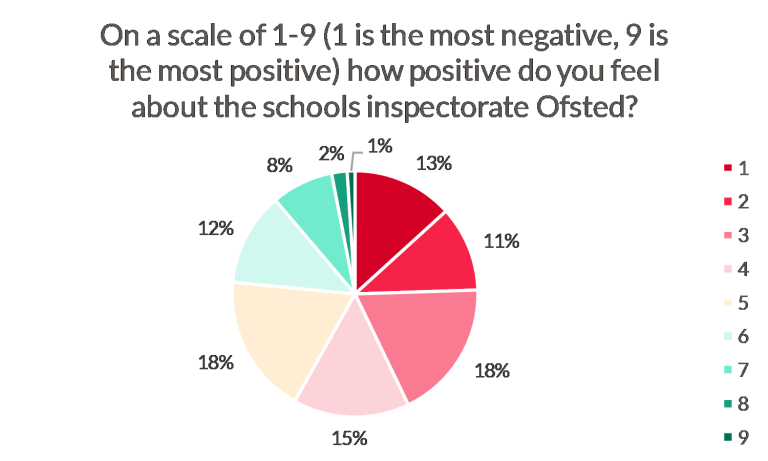3 Things we Learned about what Teachers think of Ofsted

Well, who’d have thought it – turns out we can print what teachers think about our schools inspectorate after all, says Laura McInerney…

1 | There’s not a lot of love for Ofsted
No one likes the sound of an inspection. Maybe it’s a reminder of the nit nurse or one too many airport checks, but the thought of a stranger poring over our lives, frankly, gives us the creeps. Schools inspectorate Ofsted is particularly disliked.

When asked to rate the inspectorate on a scale of 1-9 (just like GCSE grades), only 23% of teachers gave a score that could be considered even vaguely positive. When asked if the organisation was ‘trusted and reliable,’ things got even worse, with only 16% of teachers agreeing the inspectorate met the bar.
Less experienced teachers were noticeably more positive than teachers who’ve served for several years, suggesting that the more inspections someone goes through, the more likely they are to have a negative one eventually. And even just one bad experience seems to mar their views forever.
2 | Inspections can prompt gaming behaviours
Another reason why teachers may not trust Ofsted is that they’ve seen their own school try to cheat the system. Around one in 12 teachers has been asked to teach a class that is outside their usual timetable when an inspector is in, either in a support role or as the main teacher.

Even worse, 24% of secondary teachers said they had worked in a school where children had been deliberately kept at home, or sent off on a trip, when Ofsted visited.

A further 8% of teachers have been called back into school for an inspection even though they were due to be at a training day, or annual leave, or were lying at home on their sickbed!
Leaders will rightly point out that it’s in the interest of the school community to represent the school in the best light, and each of these actions helps towards this.
Schools in the poorest areas were more likely to partake in such ‘gaming’, possibly as a consequence of the higher stakes for their school, given the higher threat of a low inspection grade.
Nevertheless, it explains why Ofsted are now looking to reduce the notice period for school leaders. Less warning time means fewer of these behaviours are possible!
3 | Teachers are quite positive about Ofsted inspecting the curriculum
Although teachers are not typically enthusiastic about the inspectorate, they do appear sympathetic towards the plans for inspectors to look more closely at the curriculum.
When asked, 94% of our panel were at least somewhat supportive of plans to judge a school’s curriculum intentions, implementation, and impact.
However, just 4% think that inspectors will be able to do it well!
Why is this?
Three reasons dominated: inspections aren’t long enough for a proper look at curriculum; inspectors don’t have enough curriculum expertise; and there isn’t a clear enough view of what a quality curriculum looks like, especially as the Chief Inspector, Amanda Spielman, has said that Ofsted won’t be officially ‘approving’ any model.
For more snappy insights like this, and to be part of the panel, please join in via the free Teacher Tapp app – available to download for iOS and Android. You will learn something new every day.
Laura McInerney is an education journalist and co-founder of Teacher Tapp. Download the app for free via the App Store on Apple and Android. Follow her on Twitter at @miss_mcinerney.












